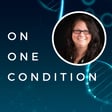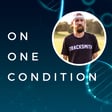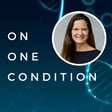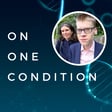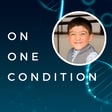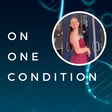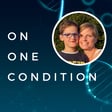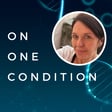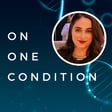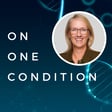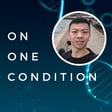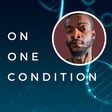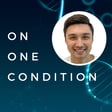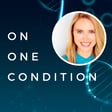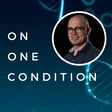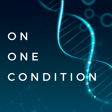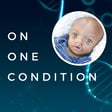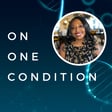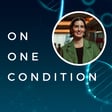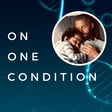Introduction to the Podcast and Guest
00:00:00
Speaker
Hi, I'm Sylvain Bertolo, and you're listening to on One Condition, a podcast to raise awareness about health conditions by listening to people who live them every day. My guest today is Giselle Cortes, and we're going to talk about Cushing syndrome.
00:00:16
Speaker
Hi, Giselle. How are you doing today? Hi, I'm doing well. How are you? I'm great, thank you. And I'm glad to have you on the podcast. As you know, love starting with a song. So which song did you choose and why?
00:00:31
Speaker
I chose the song by Andra Day. It's called Rise Up. And I chose that song because it's something that I relate to a lot.
00:00:42
Speaker
She mentions in her chorus how she'll rise up time and time again, you know, through difficulties in life. And I feel like that's basically what I've had to do, you know, life hasn't always been easy, but each time i think I come back a little bit stronger and previous experiences seem to kind of make sense.
Giselle's Song Choice and Personal Resilience
00:01:04
Speaker
and Okay. So it's not only about addressing challenges, but also for learning along the way and and knowing better as you go along. Is that what you're saying? Yeah.
00:01:15
Speaker
Right. it's It's a song that I think highlights, you know, human resilience. So I really like that song. Yeah. So we're talking about Cushing syndrome.
What is Cushing Syndrome?
00:01:27
Speaker
It's one of those conditions that I've heard about, but actually I don't really know what it is. So with your own words, could you tell us what Cushing syndrome is?
00:01:39
Speaker
Sure. Cushing syndrome is the overproduction of the hormone in our body's cortisol. And we all have it. And cortisol is for, or mean, it's typically referred to as the stress hormone.
00:01:54
Speaker
So we all need it in in a certain amount, a certain dose. But Cushing syndrome is the overproduction. So
The Diagnosis Journey
00:02:01
Speaker
in my case, I had an adrenal tumor and my production was nine times the amount of a typical body. And so when your body produces too much or you're out of balance and in a hormone, typically there are some side effects or things that start to happen, certain symptoms that are displayed. Okay.
00:02:23
Speaker
Is it something that was easy to diagnose for you or not? No, it was not because the symptoms that come from Cushing's are similar to other symptoms that are typically due to lifestyle, health, genetics, aging.
00:02:41
Speaker
So for example, hypertension, you know, doesn't really mean much. Insomnia, weight gain, you know, those don't really seem like anything too serious.
00:02:52
Speaker
So it it kind of hides in plain sight is is what I've read. And people see it, but they don't think much of it. Physicians, doctors. So it is difficult to diagnose.
00:03:04
Speaker
Is that all the symptoms you experienced yourself? No, I actually experienced several others. I had kidney stones, which occur because your body, again, is off balance. the calcification, it occurs a lot easier.
00:03:20
Speaker
I had, like I said, hypertension, gain in the face, stomach, upper shoulder area. They call it a buffalo hump because people tend to kind of look slouched or humped, like there's a hump in the back.
00:03:34
Speaker
Irregular menstrual cycles. i was I was finding it very difficult to become pregnant after I had had a miscarriage, which I think that was also kind of related because you know my body was under this nine times amount of stress.
00:03:47
Speaker
Yeah, that was a lot of things.
Seeking a Second Opinion
00:03:50
Speaker
Wow. Yes. How long did it take you to get the diagnosis? It took me, i believe, about seven to eight years.
00:04:00
Speaker
And I estimate that because, you know, that's when my body started changing. That's when I kind of started gaining weight out of nowhere. It seemed like, you know, i was eating healthy, exercising. i was always an a very active person, an athlete.
00:04:17
Speaker
And I just kind started gaining weight, but I didn't really, you know, think much of it. I thought, you know, I'll lose it in a little bit, you know, maybe a couple months. Anyway, I maintained the same doctors that I had for years because these were the doctors that I had known since I was, you know, 18, no longer able to go to a pediatrician.
00:04:37
Speaker
And I thought, they know me best. They've known me, you know, in my younger years and my super healthy years. And who else is going to know me better than them? But after years and years went by...
00:04:51
Speaker
And symptoms started, more and more symptoms started showing up and getting worse. Actually, my hypertension started getting really, really worse. I was switched to different medications.
00:05:02
Speaker
It was still rising. You know, the frustration of feeling like I was just getting worse. And everyone would just say don't worry about it. You're young.
00:05:13
Speaker
you're healthy, it'll it'll regulate on its own. ah didn't feel right anymore. i felt like I needed to go for a second opinion. And that's that's basically what saved my life. I went for a second opinion.
00:05:26
Speaker
And unfortunately, like I said, it took me seven or eight years because i held on to the idea that my older my old doctors knew me better. Gosh, it's it's crazy. And with hindsight, do you know why they didn't think about cushing?
00:05:44
Speaker
I don't know why. I've thought about that very question over and over, but I assume they probably didn't because it's listed as a rare condition.
00:05:58
Speaker
But my new doctor, he said that it's rare, yes, but not rare because it doesn't exist. Again, rare because
Diagnosis Confirmation and Treatment
00:06:06
Speaker
it hides in plain sight. People don't get diagnosed in time.
00:06:09
Speaker
And so a lot of times people think, well, I just have high blood pressure. You know, it isn't until all the symptoms start showing up at once, all of a sudden, rapidly, where they're like, okay, you've got all these symptoms that, you know, for someone my age, I i was 31 at the time.
00:06:25
Speaker
It didn't make any sense for a young, healthy woman to present with all these symptoms that Yeah, yeah, yeah. What was the moment where you decided I need to go and see someone else? like What made you get a second opinion? There was actually a lot of anger and frustration because at my last appointment with my old doctor, i told him,
00:06:51
Speaker
I don't feel good. I'm not sleeping well. I look different. I'm swollen. My stomach, I look like I'm pregnant. And he just kind of said, well, don't eat so many so many carbohydrates, exercise more.
00:07:06
Speaker
you know you're You need to lose weight. That's why you feel like this. And I was, oh my gosh, I was so angry. I told my husband when I got home, like he didn't believe me.
00:07:16
Speaker
I told him, I've told him over the years, many times I'm working out every day. I'm eating vegetables and fruit and not fast food, which is common.
00:07:28
Speaker
And I just felt like there was no concern. There was no, it was like, well, stop eating this and come back later. We'll see how you're doing when you lose weight. So at that point I said, I'm, ah can't go back there. He he doesn't believe me. Mm-hmm.
00:07:43
Speaker
And it sounds like it was the good call. So i want to talk about hypertension just for for a moment, because it can be quite detrimental to to the body. How high was your tension and how bad was it for your body?
00:08:01
Speaker
So a typical blood pressure rating is 120 over 80. And mine was hovering around 180, 190, sometimes in the 200s, over like 100, 120.
00:08:17
Speaker
it was it was creeping up pretty high. i was i was on medication when those were my readings. So it wasn't even really controlled by medicine. And that's all due to the high level of cortisol in your body. And how, so when you went to this second doctor,
00:08:40
Speaker
How did they diagnose Cushing? Was it through blood tests? Yes. So when I walked into my new doctor's office and, you know, he was reviewing the medication list, what I was on he asked me, you know, why are you taking this medicine? And I told him, well, I have high blood pressure for several years now, it Originally kind of came on from when I was pregnant and then preeclampsia is what they said I had, but it just never went away. They asked me, what else, what other conditions do you have? You know, and I told them, well, I don't sleep very well, but you know, I don't take any medicine for that.
00:09:21
Speaker
I've gained a lot of weight, but, you know, I'm working out. You know, I was afraid to go to a new doctor. or I thought, you know, he's just going to tell me the same thing. He's going to tell me to lose weight and that I'm basically fat, you know. And i was just kind of embarrassed, but I was sharing with him all the things that I've already told you.
00:09:38
Speaker
And he immediately said, you know, I believe you. believe you. I don't think it has to do with your diet. I don't believe it that it's because you're not doing exercise. I believe you have a condition called Cushing syndrome.
00:09:51
Speaker
And never in my life had I heard that before. So I asked him, what is that? Will you explain that to me? And so he did. He said, you know, you're producing too much cortisol. Your body is off balance.
00:10:03
Speaker
And so I said, okay, there a medication you can give me? And he said, no, no medication. ah We are going to have you do a number of labs and you're going to do three.
00:10:17
Speaker
One of them is going to be a salivary test. So I had to put a little cotton swab in my mouth at 11 o'clock at night. I had to do 24-hour urine collection. So I stayed home and just collected my urine in a big jug and then turned that into the lab.
00:10:32
Speaker
And then I'm going to have you do a blood test, but not just your typical AM cortisol because I had had that one in the past. This one is going to be post-dexamethasone, which is a pill that suppresses cortisol production in your body.
00:10:48
Speaker
So I took that pill at also 11 o'clock at night. And then the next morning I went fasting to the lab. They drew my blood. And instead of being a suppressed level of cortisol, my body was still extremely high.
00:11:05
Speaker
And so all those three tests revealed abnormal results, very high levels of cortisol in all three. And so he said, you know, once he got those results back that the Cushing's had been confirmed.
00:11:18
Speaker
He referred me to an endocrinologist, my new endocrinologist, and they put in a CT scan order. So I got a CT scan and that's when they kind of found that I had the the tumor there on my left adrenal gland.
00:11:37
Speaker
Wow. How quickly did that happen then? That was like a matter of days. Like it happened so quick. Thank God. i was happy to finally have an answer to know that, you know, I wasn't making these things up in my mind. And, but also I was, I was also kind of upset at myself to be honest, because I thought, oh my goodness, like, why didn't I come earlier?
00:12:03
Speaker
they, these people, these new doctors, they're helping me. They've got me all these results and exams and, I have an answer in in days. And over there, i went years, years of being unheard and told to go lose weight and not eat carbohydrates. Yeah.
Recovery and Life Post-Surgery
00:12:21
Speaker
Yeah. So you discovered that you had a ah tumor. Were they able to to then remove the tumor? And did that have a positive impact? Yes. So after it it was confirmed at the lab confirmed with the CT scan the endocrinologist and my primary care both sent in the results to a surgeon and so then I met with the surgical team the doctor and you know some nurses and they explained okay
00:12:56
Speaker
So this is what you have. It is something that we can fix. It's something that we can operate on. And what we're going to do is we're going to do a laparoscopic procedure.
00:13:07
Speaker
Your adrenal glands are above your kidneys, but we're going to go in through the front, like your stomach, your abdomen area. And we're going to remove your left adrenal gland because the tumor is on the top and your gland is like a sponge.
00:13:26
Speaker
And so we can't necessarily just take the tumor. We have to take your whole gland. You have another one. We each have two. So you can live with one. We're going to take the one that has the tumor, the left one. You'll have the right one left.
00:13:41
Speaker
However, ah what was noted in my labs was that because I was producing so much, my right adrenal gland basically was producing zero, zero cortisol.
00:13:52
Speaker
So when you when we remove your left one, your right one is going to need to wake up. It's going to need to realize, hey, I actually need to start producing cortisol because the problem is gone now.
00:14:03
Speaker
And in the meantime, you're going to need to take a steroid called hydrocortisone. And that steroid is going to make up for the difference. a Typical body needs 14 to 26 PG per ml of cortisol. And again, after the surgery, I was left at zero.
00:14:23
Speaker
So, you know, you can't live with zero either. That's that's actually really bad. um So I take a medicine. I am actually still weaning off of it slowly to kind of make up for what my body is not producing naturally yet.
00:14:39
Speaker
How long have you been on the medicine now? How was the surgery? Almost a year My surgery was September 23rd of 2024 and today is September 4th.
00:14:51
Speaker
So getting pretty close to a year mark. Yeah. yeah Is your right adrenal glands starting to produce cortisol now? Yes, thankfully it is.
00:15:03
Speaker
i had a blood test. It's called an ACTH test in March, so about six months ago. And it's ah it's called the ACTH stimulation test. So I go into the lab, eight o'clock in the morning fasting, i get my my blood drawn.
00:15:19
Speaker
And then i go up to the clinic, I get a shot, a little shot of ACTH in my arm. And then I wait 45 minutes to then have my blood drawn again.
00:15:30
Speaker
So when I did that in March, my body was producing 3.5, which is better than zero. However, still not in that 14 to 26 range. So, i mean, that was back in March.
00:15:44
Speaker
I think hopefully I'm doing better than that. I'm going to have another test and at the end of this month. to see how much I've improved from March, which I do believe there will be improvement because I have been able to take less medication without feeling nauseous and dizzy and lack of appetite. And you know that's what happens when you're insufficient, when you don't have enough cortisol.
00:16:11
Speaker
But I do think that I still might need like a very low dosage, which is what I'm on right now very low dosage, because i did try to go down a little bit more earlier Last month, and again, all those things started happening. I felt not hungry. i felt like I couldn't really get out of bed. So it's it's a process. My doctor explained, you know, you were sick for a long time.
00:16:34
Speaker
So unfortunately, it's going to take a little bit longer for your body to bounce back than if somebody would have got diagnosed, say, in a year or two years, you know. it It just kind of correlates with how long you went undiagnosed.
00:16:49
Speaker
Yeah. And how do you feel now? Do you feel like your body has changed and do you sleep better? Yes, definitely. i mean, this needing hydrocortisone is like the last final stretch because I i believe that the surgery was successful.
00:17:11
Speaker
I've lost all the swelling in my stomach and in my face. You can you know you could see definition in my face again. You can see my chin. I don't have the moon face that they call people who have Cushing's.
00:17:24
Speaker
I don't have insomnia. I don't have hypertension anymore. I don't take medication for hypertension. that's crazy. I was actually also very anxious and kind of depressed because my body was changing and all sorts of ways that I didn't recognize.
00:17:41
Speaker
But, you know, all that's resolved. So I feel like who I was before Cushing's, it's just this last final stretch of of getting off this medication Well, hopefully that goes smoothly from then on and you can yeah be back on track soon.
Lessons Learned and Advice for Others
00:18:00
Speaker
to that period, how do you feel? I mean, now that I know that it wasn't, you know, anything I was doing, because, you know, I was blaming myself, um I try to give myself more grace and realize, you know,
00:18:15
Speaker
Hopefully my daughters don't remember that too much. You know, they're young still and hopefully they'll grow up and completely forget about all that happened, you know. But I realized, you know, it wasn't my fault.
00:18:27
Speaker
I was trying my best. I was eating healthy. I was doing all the things that were in my control. But it didn't matter how much I exercised or didn't eat junk food. Like there was obviously a problem in my body that was never going to be resolved with eating right and exercising. so Yeah, yeah.
00:18:45
Speaker
it was out of my control is is basically what I've accepted. And, you know, now I'm just making the best of of my life and enjoying my time with my children, with my husband and, you know, taking those trips and saying yes to whatever it is that they want to do You know, have a much more positive, happier outlook. So, you know, I, I do think that going through all that has kind of made me appreciate my life today you know and and i am thankful for my children because a lot of people it's typically women who suffer from cushing's a lot of women who have cushing's they're never able to conceive they're never able to have children so my children were are miracles and so i just i'm thankful that i have them because again some people won't ever have children
00:19:39
Speaker
hey It's crazy that you had so many symptoms where you were followed by various physicians and it took so long.
00:19:50
Speaker
So there were, yeah, there were a lot of external things that were going on, you know, such as COVID, which everybody in the world was scared and shocked and nervous and,
00:20:01
Speaker
So when I would see my old endocrinologist, she would, and I would tell her, like, I'm just, I'm very anxious. Like whenever somebody in my house gets sick, like I'm like so nervous. Like I feel like somebody is going to die, you know, like I was having these awful, awful thoughts.
00:20:15
Speaker
And she would just kind of say, well, you know, it's because of COVID, you know, everybody's scared right now. Everyone's nervous. So you're, you're nervous because of COVID. And, you know, I thought, well, okay. So I started to believe, you know, some of those things and,
00:20:30
Speaker
when I would tell her, my endocrinologist, like, I don't have any cycles anymore. I don't have any periods. She would say, well, it's because, you know, you lost a baby and you had a DNC. And so your body's still off, which could be, you know, kind of right. But I went years, like, like two years without a menstrual cycle. And so at that point it was like, well, my DNC was like two years ago. So i don't,
00:20:57
Speaker
I don't think that it should take this long for my body to regulate. But, you know, I was, all my symptoms were kind of explained away by well, this happened to you or, you know, COVID's going on. i started to believe all of it.
00:21:11
Speaker
I thought, well, I guess it's, they're right. You know, they're, they're the doctor. They're right. Yeah. What would you tell someone, or if you met yourself at the beginning of this journey, what do you wish someone would would have told you?
00:21:28
Speaker
i would say, um sorry. I would say trust your intuition. You know, i knew there was something wrong So, you know, I wish I would have gone to a new doctor. So that that's the second thing I would say is go for a second opinion.
00:21:49
Speaker
And if that second doctor tells you the same thing and you still think, you know, this is not right, then go to a third doctor, go to a fourth doctor, go to however many it takes till you get a full workup, you know, labs, scans, whatever it is that's going to find an answer. Because, you know, if you don't stand up for yourself, you know,
00:22:11
Speaker
who Who will? So those would be my most important pieces of advice. Yeah. Yeah. It's difficult because i mean, I hear so many stories of people who have to advocate for themselves like you did, but it's where do you, where do you define that you think your doctors are wrong when they've done all those studies and, and,
00:22:45
Speaker
It's their job. on
Exploring Alternative Treatments
00:22:47
Speaker
But you're right that you need to trust your instincts. Yeah. That's sound advice.
00:22:56
Speaker
And did you try anything else, like any other treatment that wasn't necessarily described? Yeah, I actually... So when I lost our child, one of my friends told me like, you should try acupuncture because I told her like, I i can't, I can't get pregnant. I don't know.
00:23:12
Speaker
After that, it's just, i don't have a period. I don't think or know that I'm ovulating. And so anyway, I tried acupuncture and it really worked. You know, it actually, i told her, my acupuncturist, I'm not sleeping well. I lost a baby. I can't get pregnant.
00:23:28
Speaker
And within two months, I don't know what she did, where she was putting the needles. But within two months, I got pregnant again. And and that's when my second daughter, you know, nine months later, she was born. But it actually also kind of helped with my sleep.
00:23:43
Speaker
There were a couple of nights here and there where I kind of got some sleep. And I thought, well, I think I'm just going to stick with her. You know, she's helping me. And then I started thinking, well, okay, you know, now I'm sleeping, now I'm pregnant, like i'm I'm better now. Everything's over and done with and everything in the past was unfortunate, but you know, I'm getting through this, this is going to get better.
00:24:05
Speaker
um But the results were short lived, you know, I did have my daughter, but then, you know, I started to not sleep very well again. Later on, i actually also tried homeopathy.
00:24:17
Speaker
I didn't really know too much about it, but I had kind of shared with my mom, like, I don't feel good. And, you know, the doctors, they say I'm fine. And so she said, why don't you try this? I didn't even know what it was. You know, I'm like, well, sounds different, but okay. At that point, you know, I was kind of desperate.
00:24:34
Speaker
I had done what I thought I could do. Again, what was in my control. Yeah. And so I went with a homeopathy doctor, I guess you could call them. And he kind of helped me as well, too. There were nights when I also, he would prescribe these like remedies, you know, they weren't medications from a pharmacy. but But anyway, that would kind of help me get some sleep, too, from time to time. it helped me like lower my blood pressure a little bit for for a little bit.
00:25:00
Speaker
These other things that I was trying, they were kind of helping intermittently. I'm thankful for them, for those people that helped me. But again, there was obviously something that needed to be surgically removed. Yeah.
Raising Awareness and Future Goals
00:25:14
Speaker
Yeah. yeah It's incredible when you think about it, that acupuncture helped you when you had a tumor. and I'd love to understand the science behind it. Yeah. I don't even know, but it it it definitely did. Yeah. yeah Wow.
00:25:30
Speaker
Whoa. That's a journey you've been on. Yeah. but It's amazing that you're you're now through to it. and And I really hope that raising awareness like this will help other people who may be in a similar situation and who may be asking themselves the same questions as you did.
00:25:52
Speaker
Right. And that's why, you know, I thank you for for having me on your show. And I'm also, you know, trying to raise awareness. I wrote a book that's on Amazon. It's called Cushing Syndrome from Misdiagnosis to Recovery.
00:26:08
Speaker
And I also speak Spanish. So it's also available in Spanish. Because I believe that you know, the more my story is heard, people will, women particularly will think, yeah, I do think that something might be a little off here. Like maybe I should go get my hormones checked or, you know, see why I'm not feeling well, delve deeper into the issue instead of like, oh, well, you know, it's just something that happened to me and accepting and
00:26:39
Speaker
just not really looking further into it. So I do hope that my story will be one of inspiration, one of resilience, as I mentioned about the song in the beginning.
00:26:50
Speaker
You know, we do rise up and we do heal and we do have an incredible body that is created to heal and, and you know, to share our stories, to help others, to advocate for change, to advocate for ourselves and to advocate for doctors to kind of listen to us.
Finding Peace and Gratitude
00:27:11
Speaker
I couldn't agree more. this is i have one last question for you. i'm sorry I love asking that everyone on the podcast.
00:27:21
Speaker
What's your happy place? place where you feel at peace? My happy place is definitely the beach, the ocean. i live in California, and so I'm blessed to be able to drive there. Whenever it's the weekend, you know, my daughters, they love the beach too.
00:27:38
Speaker
we We typically, we love beach days. We go out there, we just, I could just stare at the ocean all day. Each wave is different. It's so calming, you know, when the waves come in and they recede, it's, it's, it's just majestic.
00:27:54
Speaker
You know, if, if, if you haven't seen it, it's incredible, you know, and the ocean is so vast, it goes as far as your eyes can see. And so to me, that's a sign that, you know, God is real, you know, because how else could that just all day and all night, the ocean is there, you know, the waves are coming and going and it's,
00:28:16
Speaker
It's so soothing. So that is my so my spot where I love to be. sounds nice and I feel more relaxed already.
00:28:26
Speaker
Well, thank you so much for your time. I really appreciate it And I hope you manage to get off steroids soon as well. Thank you.

